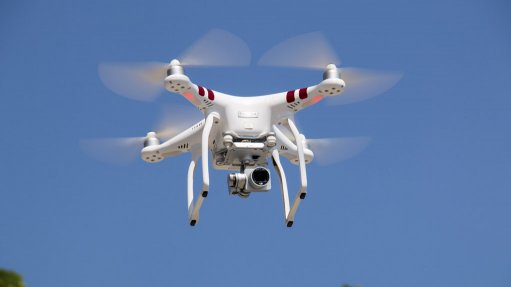
USEFUL, ACCURATE, VARIABLE Unmanned aerial vehicle applications include producing orthomosiacs, three-dimensional models, digital surface models and calculating volumes of extracted materials
Multinational aviation company ExecuJet has added unmanned aerial vehicle (UAV) services to its African facilities in Cape Town and Johannesburg, South Africa, and in Lagos, Nigeria, enabling clients to carry out inspections, surveys, mapping and photography in greater detail.
ExecuJet Cape Town flight operations GM Philip du Preez tells Mining Weekly that the market for drone technology in the commercial sector has been increasing in recent years and is expected to grow at a rate of more than 19% from 2017 to 2020.
He points to research done by economist and economic adviser to the Commercial Aviation Association of South Africa Dr Roelof Botha, who forecasts that the South African drone market is expected to create more than 24 000 jobs by the end of 2018, as well as contribute more than R2-billion to the economy. “It is clear after comparing 2015 data with the latest economic-impact assessment that the domestic drone industry is expanding exponentially,” explained Botha at a UAV conference held in June. These expectations underpin ExecuJet’s strategic decision to introduce the UAV service offering in sub-Saharan Africa.
“We believe that UAVs are not only going to play an integral part in commercial aviation operations in the future, but we also see this offering as a natural extension, offering a complete aviation solution to our clients.”
Du Preez explains that UAVs, more commonly known as drones, will form an integral part of ExecuJet’s operations and be offered on a monthly contractual basis or on an ad hoc basis – depending on clients’ requirements. “Each mission will require a specific UAV, whether it be for filming a TV production, surveying utility lines, showcasing a property for an estate agent or analysing stockpiles at a mine. Our UAV offering includes multirotor and fixed-wing solutions.”
He adds that the company delivers turnkey UAV solutions, dispatching the UAV, with an operator to conduct the work, and producing reports if necessary.
“South Africa has been at the forefront of UAV use and the development of associated regulations. The development of these regulations – established through partnerships within the industry and the South African Civil Aviation Authority (SACAA) – has seen many other African nations looking to South Africa for guidance and training,” says Du Preez.
Moreover, he notes that, long before the commercial opportunities and applications of UAVs became apparent, the South African military was using these platforms for peacekeeping and border patrols. “The most notable is the locally developed Denel Dynamics Seeker, introduced by State-owned defence equipment manufacturer Denel Dynamics, then called Kentron, in 1986.”
Industry Benefits
Du Preez notes that one of the foremost benefits of drone technology, specifically in the mining industry, is safety, as a UAV can monitor or even enter areas that may be dangerous to human life. “UAVs can also perform continuous and repetitive duties, without having to factor in labour aspects, such as duty times,” he adds.
UAV applications in the mining industry further include producing orthomosiacs (high-resolution aerial images taken using coordinates from global positioning satellite systems), three-dimensional models, digital surface models of openpit mines and quarries, as well as calculating volumes of extracted materials and stockpiles.
“UAV-based surveying increases data collection time and boosts productivity. Tasks that typically took weeks can now be accomplished in hours. A UAV can remain airborne while the operator moves around a pit, whereas a surveyor with terrestrial instruments would need to shut down in between moving points,” explains Du Preez.
He notes that another major innovation is the exact pinpointing of drill points for optimal blast designs, adding that UAVs are used to gather pre- and post- blast data, as well as the identification of explosive misfires, which further enhances safety.
“We have also seen the increase in UAV use for mineral exploration – calculating resources and modelling catchment areas. Other applications include feasibility studies, pit and dump management, environmental assessments and management, and hydrology.”
Du Preez affirms that the adoption of UAVs in the mining sector has become a key resource for the entire mine management process in terms of safety and cost savings.
Meanwhile, ExecuJet will also offer intensive remote pilot licence (RPL) training to its current pilots and staff through its certified SACAA partner to ensure that staff are fully able to meet and carry out client requests safely and efficiently.
“Students considering obtaining an RPL should have a current medical assessment; be 18 years of age or older and pass an English language proficiency test,” says Du Preez. Additionally, students will have to successfully complete the training course and a written examination that covers nine subjects. The students then need to complete a practical flight test with a certified flight instructor and prepare for the final skills test with a designated flight examiner. Thereafter, the student can submit the licence application for approval by the SACAA.
Du Preez notes that people who have private or commercial pilots licences will be accredited if they wish to add the RPL to their licence. Training is available in Cape Town and Johannesburg.